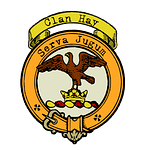Welcome back to "A Clan A Day Podcast," brought to you by bagtownclans.com. I'm your host, Colin MacDonald, and today we're diving into the rich history of Clan MacLachlan, one of Scotland’s ancient Highland clans, deeply rooted in both the land of Argyll and the ancient Gaelic traditions of Ireland.
Clan MacLachlan claims a noble lineage tracing back to the 5th century Ulster Royal family of O'Neill. Tradition says that the clan’s progenitor, Anrothan O'Neill, a prince from Ireland, came to Scotland in the 11th century. He married into Scottish nobility, securing the lands of Knapdale and Cowal. From this ancient union arose the MacLachlans, MacNeils, and other prominent clans, all linked to the great Irish dynasty of Niall Noígíallach, or Niall of the Nine Hostages, the legendary High King of Ireland.
The name "MacLachlan" itself is derived from the Gaelic "Mac Lachlainn," meaning "son of Lachlan." It is believed that the name "Lachlan" comes from the Old Norse term "Lochlan," which the Scots used to refer to the Norsemen. This hints at the possible Viking influences in the clan’s early history, especially considering their location along the western coast of Scotland, near the Isle of Mull and Loch Fyne, where Norse raiders were often seen.
The early documented history of the clan can be traced back to the 13th century when Gilchrist MacLachlan is mentioned in a charter in 1292, during the reign of King John Balliol. By the time of Robert the Bruce, the MacLachlans had cemented their place in Scottish history, with Chief Gilleskel MacLachlan supporting Bruce’s cause in the Wars of Scottish Independence and attending his parliament at St. Andrews. Gilleskel’s name also appears on the list of magnates who signed a letter to Philip IV of France, affirming Scotland’s independence.
The clan's seat, Strathlachlan, overlooks the shores of Loch Fyne, where the impressive ruins of Old Castle Lachlan stand to this day. The castle, built in the 15th century, was the home of the MacLachlan chiefs for centuries. Though it now lies in ruins, it remains a symbol of the clan's enduring presence in Argyll. In the late 18th century, the family built New Castle Lachlan nearby, a grand manor that still serves as the home of the current clan chief.
Clan MacLachlan’s loyalty to the Jacobite cause marked a pivotal chapter in their history. In the 1745 Rising, Lachlan MacLachlan, the 17th chief, led his clan into battle for Bonnie Prince Charlie. Acting as an aide-de-camp to the Prince, Chief Lachlan was tragically killed at the Battle of Culloden, struck down by a cannonball. After the Jacobite defeat, the clan’s ancestral castle was bombarded by a government frigate, leaving it in ruins. However, thanks to the intervention of the Duke of Argyll, the MacLachlans were able to reclaim their lands, which remain in the family to this day.
A fascinating aspect of Clan MacLachlan’s history is their close ties to neighboring clans, particularly the Lamonts and MacEwans, with whom they share a common ancestry. According to tradition, these clans descended from three brothers, the sons of De Dalan, an Irish nobleman. This connection extended beyond shared ancestry, as the MacLachlans, Lamonts, and MacEwans frequently intermarried and shared responsibilities. A long-standing custom held that when a Laird of Strath Lachlan or a Laird of Strachur (from the Campbell family) died, the other would attend the funeral and help lay the head of the deceased in the grave.
The clan’s symbolic traditions also reflect their maritime and Gaelic heritage. The MacLachlans’ crest features a castle on a rock, a symbol of strength and stability, along with the Latin motto "Fortis et Fidus," meaning "Strong and Faithful." Their badge, the lesser periwinkle, further evokes the rugged coastal lands they have called home for centuries. The clan’s pipe music, "Moladh Màiri" or "In Praise of Mary," remains a beloved piece of their cultural legacy.
Though the MacLachlans were primarily known as fierce warriors, they also played a significant role in preserving Gaelic literary traditions. Manuscripts kept by the MacLachlans of Kilbride, including the famous 1450 genealogy, were among the crucial documents used to authenticate the oral history of Highland clans, including the poems of Ossian. In more recent history, Ewen MacLachlan, a 19th-century Gaelic poet and scholar, carried on this literary tradition, earning a reputation for his contributions to Gaelic literature and culture.
Today, Clan MacLachlan remains active through the Clan MacLachlan Society, which has branches around the world. The society works to preserve the heritage and history of the clan, and the Lachlan Trust plays a key role in maintaining historic sites such as Kilmorie Chapel, the traditional burial place of the MacLachlan chiefs. The current chief, Euan John MacLachlan of MacLachlan, resides at New Castle Lachlan and continues to uphold the traditions and values of his ancestors.
In closing, the story of Clan MacLachlan is one of resilience and loyalty. From their ancient roots in Ireland to their long-standing home in the Highlands, the MacLachlans have weathered the storms of Scottish history with strength and faithfulness. Their contributions to Scottish history, culture, and the Jacobite cause ensure that their legacy will endure for generations to come.
Thank you for joining us on this episode of "A Clan A Day Podcast." Be sure to tune in tomorrow as we explore the history of another storied Scottish clan. I'm Colin MacDonald, and as always, go n-éirí an bóthar leat.













Share this post